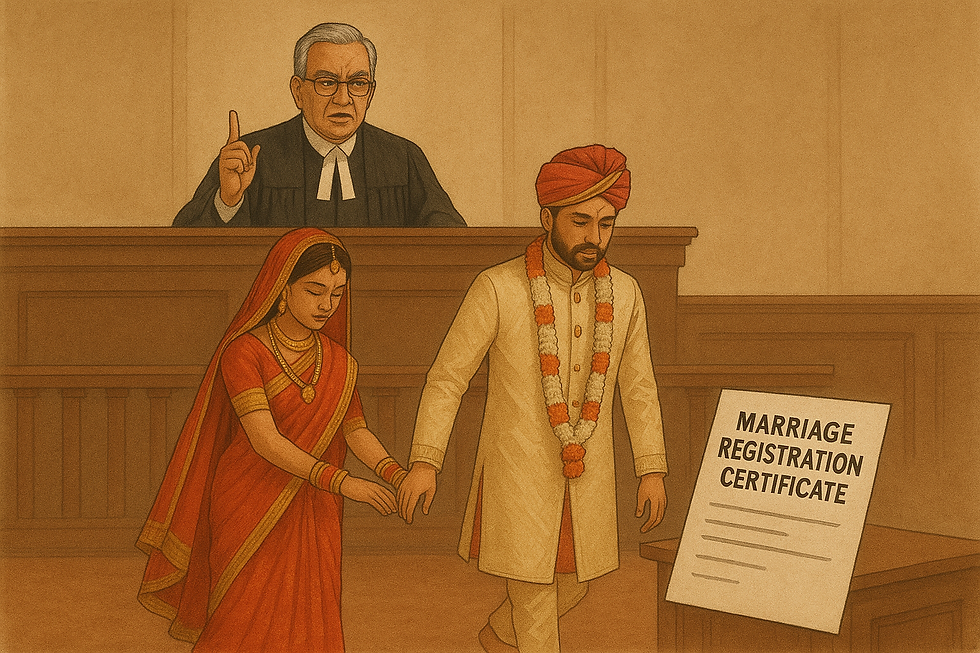Allahabad High Court: Hindu Marriage Valid Without Registration.
- Lawttorney.ai

- Sep 3, 2025
- 3 min read
Case Name: Sunil Dubey vs Minakshi (2025).
Introduction:
India is known for world’s Lavish weddings and their customs but behind all lavishness, a significant legal question arises: Is marriage social and cultural ceremony, or it carry deeper legal Importance? How Law views a marriage that isn’t registered mainly under personal laws like Hindu Marriage Act. Recently, The Allahabad High Court ruled that marriage without registration under Hindu Marriage Act is valid.

Background:
Husband (Petitioner) and Wife (Defendant) filed the application under Hindu Marriage act 1955, Under Section 13(B) for Mutual Divorce 23.10.2024 in Family Court. The learned Family court judge rejected the application stating that under Rule 3(a) of Hindu Marriage and Divorce Rules, 1956 dated 18.09.1956, (hereinafter referred as "Rules, 1956") it must for the parties to annexed the marriage certificate in divorce proceedings under Hindu Marriage Act 1955 and as per the rule it cannot be exempted and Application is rejected. Hence this petition.
Legal Analysis:
Section 13(B): Provides for divorce by mutual consent, allowing a couple to jointly petition the court for divorce after living separately for one year or more and mutually agreeing that the marriage should be dissolved.
High Court Insight:
The High Court held that marriage under Hindu Marriage Doesn’t become invalid merely because of non- registration therefore Family Court Cannot insist to produce the marriage certificate in a mutual divorce.
Court Observed that,
"When a Hindu marriage is solemnized in accordance with the provisions of Hindu Marriage Act, 1955, in order to facilitate proof of such marriage by Section 8(1) of the Act, 1955, the State Governments are empowered to make rules for registration of such marriage. Such Rules may provide for keeping over Hindu Marriage Register wherein parties may record the particulars of their marriage in such manner and subject to such condition as may be prescribed. The purpose of registration is only to furnish convenient evidence of marriage"
Court emphasized that the registration is only the piece of paper to verify the marriage and non- registration of marriage didn't violate the Subsection 5 of Section 8 of the Hindu Marriage Act, 1955.
Bench Referred the case of Dolly Rani v. Manish Kumar Chanchal in which Supreme Court led down an Important meaning of the Hindu Marriage.
Follow Traditional Rituals without ceremony it will be void despite marriage registration.
Court Said “Just receiving a certificate from an entity without these ceremonies doesn't confirm marital status or establish a marriage under Hindu law”
Hindu marriage is a sacred occasion and not a "song and dance" and "wining and dining" event.
Court said section 7 of Hindu Marriage act states that "ceremonies of a Hindu marriage" must be complied with for the validity of the marriage. If not followed it's not valid in the eyes of the law.
Court noted that word "solemnized" indicates that marriage not considered valid until ceremony performed.
According to section 7(2) includes the word “Saptapadi” means taking seven steps together then only marriage considered Solemnized.
Marriage Helps in having children, strengthens the family, it an important event and special which brings spirituality must perform according to rituals and traditional which make the couple spiritual better.
Registration of Marriage is valid only if marriage if performed according to section 7 of Hindu Marriage Act 1955.
Conclusion:
In accordance with Section 7 of the Hindu Marriage Act, 1955, the Allahabad High Court decided that a Hindu marriage is lawful even if it is not registered if it is appropriately solemnized through traditional procedures. The Court made it clear that registration is merely proof of marriage and is not necessary for it to be deemed lawful. Because a mutual divorce could be requested without a marriage certificate, the Family Court erred in rejecting the application. Hindu marriage is about fulfilling the rites, not about getting a registration document.
Empower Your Legal Practice with AI – Join Our Free Webinar!
Are you a legal professional looking to boost your efficiency and stay ahead in a competitive field? Discover the power of Lawttorney.AI – the cutting-edge tool designed to streamline legal research, automate tasks, and enhance productivity.
👉 Don't miss out! Reserve your spot in our FREE webinar and experience the future of legal practice today. Register Now



Comments